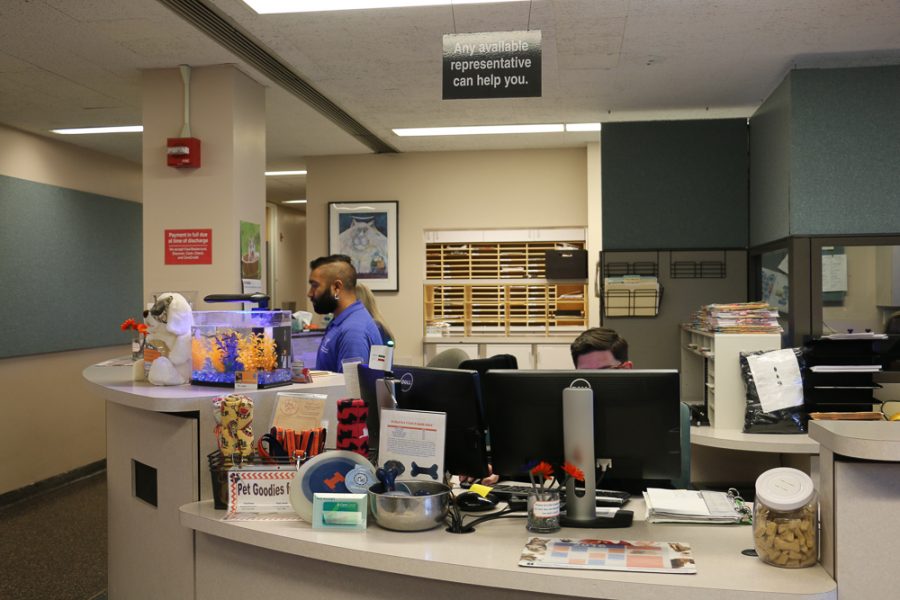Illinois vet-med treats a variety of animals
Employees work at the front desk of Small Animal Clinic inside Veterinary Teaching Hospital building on Thursday, Nov 10, 2016.
Nov 15, 2016
There is no typical day inside the Illinois College of Veterinary Medicine Small Animal Clinic. From dogs and cats to owls and cranes, Illinois Vet-Med takes on animals of all kinds. Once they come through the door, there’s no telling what can happen.
Located in Urbana just past the Illinois arboretum, Vet-Med consists of two clinics: a small animal and large animal clinic, which serve as both a full service animal hospital as well as a teaching clinic for students. With 24/7 emergency care services, the staff stays in tune with whatever may happen.
Leiah Carney, a small animal clinic emergency room technician, has worked at Illinois Vet-Med for 15 years: seven years in the intensive care unit and eight years in the ER. The intensive care unit serves as a place where animals are kept if they need extensive hospitalization. The ER focuses on stabilization as well as diagnostic workup.
As one of the six ER technicians, Carney serves as a “traffic director,” where she draws blood for IV Catheter replacements, does CPR, submits requests for blood work and radiographs and takes phone calls from the front desk.
“You can always expect the unexpected. I can’t tell you how many times I always say, ‘This is a really weird day. Every day is a weird day,” Carney said.
Get The Daily Illini in your inbox!
Taking on “any case, any time, anywhere, for any reason,” Carney has seen guinea pigs, hamsters, birds and rabbits. Though there is no way to prepare for the unexpected, Carney has ways to make the process smoother.
“I feel like being the most educated that you can be about emergency situations is the best way to be prepared for any situation,” Carney said.
With simple procedures like making sure that each room is stocked with syringes, needles and fluids, being prepared goes a long way.
“(We) make sure that we’re ready to go. Because you don’t ever want to have an emergency and not be prepared,” Carney said.
Patients come from all over the Illinois area. Some are brought by truck drivers and others travel hours to get to Illinois Vet-Med. For every issue, there is a specialty to help.
“Almost every specialty that human medicine has, veterinary med has also,” Carney said.
Some of these specialties range from neurology to cardiology.
Jessica Garrett, also a small animal clinical technician, has been working at Illinois Vet-Med since 2005, with experience in the intensive care unit. Similar to a nurse, Garrett’s job consists of patient sampling, working with blood and urine samples, and drug and fluid administration. There to “help things flow,” Garrett also works with scheduling, blood work requests and being involved in any procedures with the animals.
By assessing patients and helping to stabilize them in the ER, Garrett has pre-made kits that she prepares for the emergency situations.
“It’s always ready to go. So if something comes in and it’s crashing or seizuring or something and it needs an IV catheter right away, we have all the stuff ready to go,” Garrett said.
Though emergencies by nature are unexpected, a call in before arrival to the clinic helps Garrett prepare more for a patient’s needs.
“If I know something is coming and I know the history of it, I set up everything I need for it. I like to prepare for the worst and hope for the best,” Garrett said,
Both Garrett and Carney work with University and Parkland College students in the Vet-Med field. Students practice in the clinic’s ER, asking procedural questions and work hand-in-hand everyday. Students also gain clinical experience by practicing technical skills, which include placing IV catheters and drawing blood.
Maureen McMichael, clinician, teacher and researcher at Vet-Med, works with ER students, interns and residents. Rounding with residents on critical care services, McMichael sees cases and discusses them with the veterinarians. From teaching in the classroom to speaking at professional conferences, McMichael also coordinates and runs several research projects.
Working at Illinois Vet-Med for nine years, McMichael has seen bearded dragons, turkey vultures, miniature pigs and stray chickens.
Working with all types of animals in emergency situations has given staff bittersweet moments.
“We had an elderly woman that was in her home, sitting with her dog on her lap, and the neighbor’s dog jumped her fence, came crashing through the screen door and grabbed her chihuahua. She was on a fixed income and came in to ER in tears as she had very limited funds. Due to a big-hearted donor we were able to save her dog’s life,” McMichael said.
Though the animals can’t speak for themselves, at the end of the day a “thank you” finds its way.
“What always makes me feel really good is when I have an interaction with an owner and they’re like, ‘Thank you so much for being here’ and I’m just doing my job.” Carney said.






